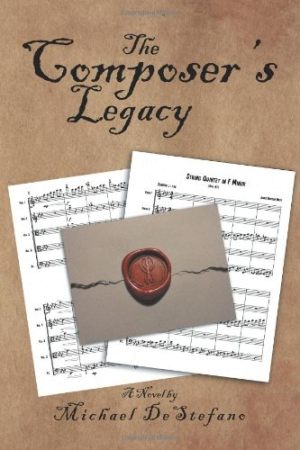The Composer's Legacy
This multifaceted story offers thoughtful insight into classical music and historical research.
A music professor inherits a recluse’s hauntingly original musical compositions in Michael DeStefano’s detailed first novel, The Composer’s Legacy. Concurrent plots involve the travails of protagonist David Whealy, assistant dean of music at the University of California, and his unexpected inheritance from James Burton West, a composer who lived in a centuries-old house on the Delaware coast.
The California story centers on David’s dedication to his students amid conflicts with the vainglorious dean of the music school and confused feelings for teaching colleague Carla Macklin. Having never met James, David makes periodic trips to Delaware to study the man’s music, artwork, personal journals, and family history; Beth Grey, his new neighbor, also sparks his interest.
Detailed descriptive passages slow the pace of these conjoined plots. When David visits the Delaware Public Archive for the first time, a long paragraph describes the research library’s physical components, including this line: “To the left side of the entrance was a curved information desk with a double door elevator located behind it.” Other than setting the scene, this information, along with the number of staff members, type of tables and chairs, and list of research resources, have minor relevance to the action.
James’s journal entries are italicized and indented, a format that effectively defines the persona of an absent but pivotal character. DeStefano, an Air Force veteran, gives James the same occupational identity. On completion of a symphonic fanfare to commemorate the fiftieth anniversary of the corps, the composer writes, “The trumpets are the officers who make up the Air Force’s leadership. The horns, the Air Force spouses and dependents whose support is never forgotten.”
Errors in tense agreement, point-of-view changes, and misspelled or misused words undermine the text’s readability. For example: “David remembered an ancient Asian proverb stating that if one wished to learn the true heart of another, they should get them angry.”
The Composer’s Legacy is a story of secrets and suppressed emotions that have the potential to undermine careers, relationships, and historical accuracy. Initially, the characters, almost all from academia, interact politely, speak formally, and lack believability. As the story progresses and trust builds, they develop into more realistic characters with relaxed dialogue and mannerisms. Of particular note, Carla and Beth, both eager for David’s attention, mistrust each other but grow in mutual understanding through a series of well-drawn verbal exchanges. The two plot threads also evolve to more interesting levels as David and Carla work to solve music school problems, and he and Beth uncover more of James’s enigmatic past in Delaware.
This multifaceted story offers thoughtful insight into classical music and historical research.
Reviewed by
Margaret Cullison
Disclosure: This article is not an endorsement, but a review. The publisher of this book provided free copies of the book and paid a small fee to have their book reviewed by a professional reviewer. Foreword Reviews and Clarion Reviews make no guarantee that the publisher will receive a positive review. Foreword Magazine, Inc. is disclosing this in accordance with the Federal Trade Commission’s 16 CFR, Part 255.

